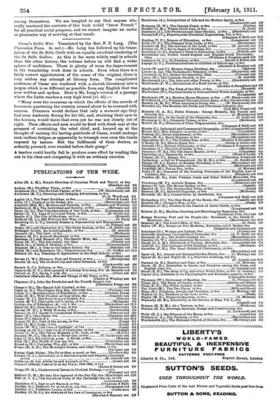Crrsar's Gallic War. Translated by the Rev. F. P. Long.
(The Clarendon Press. 3s. net.)—Mr. Long has followed up his trans- lation of the De Bello Civili with an equally excellent rendering of the De Bello Gal/ico. As this is far more widely read in schools than the other history, the volume before us will find a wider sphere of usefulness. There is plenty of room for improvement in the translating work done in schools. Even when there is a fairly correct apprehension of the sense of the original, there is very seldom any attempt at literary form. The complicated sentences of Cmsar are rendered with a slavish literalness into a jargon which is as different as possible from any English that was ever written and spoken. Here is Mr. Long's version of a passage where the Latin reaches a very high level (vi. 43) :-
" Many were the occasions on which the efforts of the crowds of horsemen quartering the country seemed about to be crowned with success. Prisoners would declare that only a moment ago they had seen Ambiorix fleeing for his life, and, straining their eyes to the horizon, would insist that even yet he was not clearly out of sight. Then officers and men would be fired with fresh zeal at the prospect of overtaking the rebel chief, and, buoyed up at the thought of earning the lasting gratitude of Ctesar, would undergo such endless fatigue as apparently to triumph over even the limits imposed by nature. But the fulfilment of their desires, so ardently pursued, over receded before their grasp."
A teacher could hardly fail to produce some effect by reading this out to his class and comparing it with an ordinary exercise.






































 Previous page
Previous page